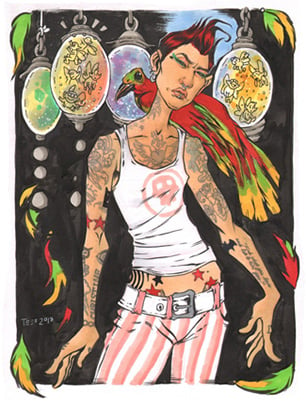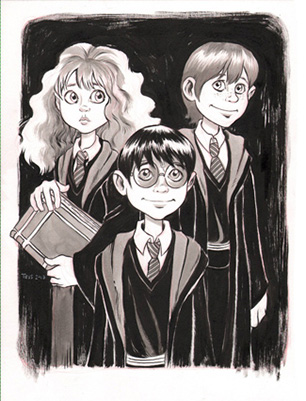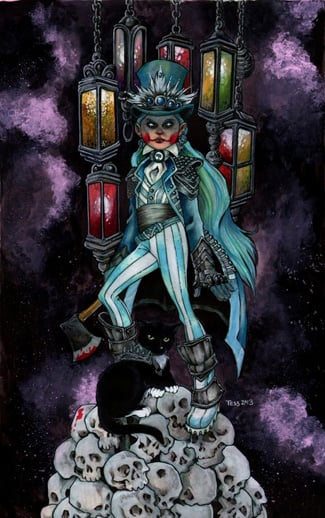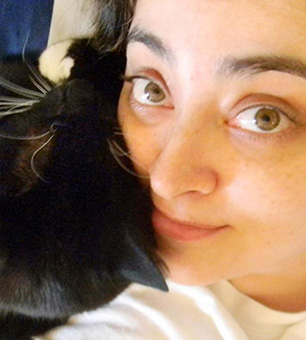Comics artist Tess Fowler has a second great talent—communicating about misogyny through social media. Warning: This article contains accounts of sexual assault and may be triggering to some people.
For comic book illustrator Tess Fowler, being an artist isn’t just about creating culture, but actively seeking its improvement. She currently works mostly on creator-owned projects outside of the major comic book publishing houses, and she’s set to release a new web-based comic soon called The Rascals. She’s cultivated a loyal band of followers, known as the “Porkchop Army” (her Facebook followers) or the “Apocalypse Princess Army” (named for her version of the Disney Princesses, which have become popular as costumes), with whom she interacts constantly on social media.
A female working in a traditionally male industry, Fowler has been open about the misogyny and sexism she’s found—and she’s speaking out to her peers, even encouraging her colleagues to call out the misogynists in her business by name. That’s a brave act in a world where female artists remain rare.
 Artwork by Tess Fowler.So it was no surprise to find Tess involved in a flare up on Twitter earlier this week about sexism and rape culture. Such an occurrence on Twitter is not unusual. At any moment, somebody on the Internet is fighting about rape culture. The heated public arguments over (former) Senator Todd Akin’s comments about “legitimate rape” and comedian and Comedy Central show host Daniel Tosh’s “rape joke” show how widespread and consequential these conversations can become.
Artwork by Tess Fowler.So it was no surprise to find Tess involved in a flare up on Twitter earlier this week about sexism and rape culture. Such an occurrence on Twitter is not unusual. At any moment, somebody on the Internet is fighting about rape culture. The heated public arguments over (former) Senator Todd Akin’s comments about “legitimate rape” and comedian and Comedy Central show host Daniel Tosh’s “rape joke” show how widespread and consequential these conversations can become.
The latest conversation began when Fowler shared a story of a successful industry figure (and married man) feigning interest in her work in order to try to lure her into a sexual encounter.
The unnamed man in Fowler’s story led Twitter user @grimdominatrix to relate an unfriendly encounter with another illustrator in the industry, @MrSheldon.
@royalboiler jsyk sheldon vella is one of those creeps, he threatened to rape me once bc i said a drawing of his creeped me out
— charley matz (@grimdominatrix) October 29, 2013
Brandon Graham, creator of the Eisner Award winning comic book King City and apparently a friend of @MrSheldon, responded, wondering about the difference between bad behavior on the Internet and serious threats of sexual violence.
@grimdominatrix I assume that was him being an asshole over the internet? Certainly not cool for him to throw around rape like that.
— Brandon Graham (@royalboiler) October 29, 2013
The discussion devolved from there when @MrSheldon, swinging for the hyperbolic grand-slam, chimed in on his own behalf.
@grimdominatrix@royalboiler SHUTTHEHELLUPBEFOREIRAPEYOU!!
— Mr. Sheldon Vella (@MrSheldon) October 29, 2013
Eventually the conversation circled back to Fowler, who with calm demeanor and clear conviction provided her followers a discussion on the difficulties inherent in using the language of sexual violence, and how it is frequently misunderstood by the men who use it.
@royalboiler@grimdominatrix willingness to have open ears and logical discussions and debates. More open dialogue like this is what
— TessFowler (@TessFowler) October 29, 2013
“…the world needs MORE of,” she said, finishing up the thought in her next tweet.
I came away from this affair with great admiration for Fowler. It was clear there was something special about what she was doing. As a model in the continuing movement toward equality, Fowler’s a figure worth meeting.
I reached out to Fowler to discuss her efforts combating misogyny and sexism in the comics industry and in our culture at large.
Chris Finke: There are still high profile figures that see comics (especially superhero comics) as a world for boys. Todd McFarlane, for example, has said he doesn’t believe the superhero comic is an arena that can embolden females. You’ve chosen to boldly challenge these issues. Why?
 Artwork by Tess Fowler.Tess Fowler: I love comics and their surrounding community. But it is not an exaggeration to say that this community has blown up in size in the last year or two. It is more evident now than ever before that comics are sorely lacking content and friendliness (to say the least) toward not only women, but LGBT folk and people of color. It’s past time to address these issues. I have had my own experiences with prejudice, sexism, misogyny, and assault as a direct result of my pursuit of a career in comic books and art.
Artwork by Tess Fowler.Tess Fowler: I love comics and their surrounding community. But it is not an exaggeration to say that this community has blown up in size in the last year or two. It is more evident now than ever before that comics are sorely lacking content and friendliness (to say the least) toward not only women, but LGBT folk and people of color. It’s past time to address these issues. I have had my own experiences with prejudice, sexism, misogyny, and assault as a direct result of my pursuit of a career in comic books and art.
I am also a survivor of childhood abuse, so it’s easier for me to challenge the status quo. It’s how I survived growing up where I did. Now that I’m grown I have the power to speak loudly, clearly, and to wield a big stick. I believe if I continue to charge into the fray, others will find the strength to follow suit.
Finke: You seem open to discussing your personal experiences with misogyny and sexism in the comic book industry. Do you feel a responsibility to do so?
Fowler: I feel a responsibility to do so, yes. Because I’ve worked hard to overcome my life’s negative experiences and be a stronger person. Therefore it is up to me to use the voice I possess to let others know they’re not alone. I do it via social media, whenever it is relevant to the topics of conversation or debate. And I speak often about survival, strength, and the healing power of art.
Finke: Do others in a similar position have a similar responsibility?
Fowler: If someone else has experiences similar to mine within the industry, I cannot hold them personally responsible if they choose silence. I understand that money is an issue, especially with times being so lean.
Finke: Do you have any fear of retribution or blacklisting for your openness? Do you think it’s reasonable for up-and-coming artists to worry about such problems?
Fowler: One false move and you’re blacklisted for life. Professionally it is a very small city and bad news travels fast. So we are taught from day one, at the bottom rung of the ladder, to watch for the [sexist] jackals (we all know their names), to take every hit on the chin, and keep moving. That’s the only way to succeed.
There are successful female artists and writers who have a lot of fun echoing their male counterparts in saying, “It’s not a women’s issue. Any female with the chops to keep up with the boys can have a place at the table.” And, I’m sorry, but that’s just not true. Women in the comic book trenches know that. So if a woman doesn’t want to speak up, I get it. I mean, I wish she would, for the sake of the newcomers. But I do get it. I stopped pursuing major comic book work about a year ago and never looked back. So I’m not in danger of losing anything. I can speak freely.
Some of the fear still tickles my heart now and again, but a great deal of it lost its hold on me when I read Brandon’s tweets on Bleeding Cool. It felt like a moment of real change was happening. If a few tweets on a computer screen can do that for me, think what it would mean if men in the industry drew a hard line in the sand about abusive behavior and content. If they all chose to speak out, and allow their work to reflect their views.
Finke: Last year there was a flare-up over Daniel Tosh’s “rape joke,” which led to Louis CK and Patton Oswalt, among others, publicly discussing how their personal perspective on such jokes had changed. Do you see any sign of this kind of change in the comic industry?
 Artwork by Tess Fowler.Fowler: I had mixed emotions about the rape joke controversy. I have always been a firm believer that art should have no limitations. No boundaries. Comedy is a form of art. Yet some things just aren’t funny for me. Some things still trip my sensors and send up my red flags. It’s a matter of public safety in my opinion. I feel humans are only ever seconds away from anarchy, and it’s up to us to be vigilant. To self-police, you might say.
Artwork by Tess Fowler.Fowler: I had mixed emotions about the rape joke controversy. I have always been a firm believer that art should have no limitations. No boundaries. Comedy is a form of art. Yet some things just aren’t funny for me. Some things still trip my sensors and send up my red flags. It’s a matter of public safety in my opinion. I feel humans are only ever seconds away from anarchy, and it’s up to us to be vigilant. To self-police, you might say.
At this point the comics industry has to adapt or die. It’s time. No, let me amend that. It’s past time.
And you’re talking to a lifelong fan of the cape comics and good ol’ boys kind of genres. I’m not even saying they have to go away. I’m saying it’s time to let the new blood in and change their way of thinking. To evolve with the rest of the world, or go the way of the dodo.
Finke: The reaction of many males in discussions about rape culture and the language of violence is generally defensive. Yet you seem to be able to maintain a level of discourse that is respectful not only the issue but of all parties. How do you do that?
Fowler: Oh, I have been met with firm and ugly opposition much of the time. Men who come into the arena already swinging their flails and screaming for my blood. Men who don’t want change. Those men I see coming, and I engage them in open discourse. I give them a chance to see reason, and give them room to calm down. But if they choose to be volatile anyway, I let them speak their hateful words and keep them talking long enough to let them prove my points.
It’s not personal. They don’t know me, so I don’t go for their jugulars. (I used to, but it only led to bloodshed and never taught my followers anything other than how awful people can be.) Now I try to lead by example. I keep my eye on the end goal. This person opposing me is defensive for a reason. Maybe he’s defensive because he feels threatened. So I immediately remove the perceived threat. If he is still upset, I make him feel safe. And so on.
I want an ally because that ally is going to go forth and make new allies. Race, religion, politics, gender, or sexuality don’t matter. We have to reach out and link arms if there is to be any kind of change. Not just in comics, but in the world as a whole. I believe comics can change the world. It’s a very potent kind of art. It’s also my passion. So I am starting in my own backyard.
Finke: You’ve chosen to speak out on behalf of women and men for equality, and against the domination and mistreatment of women. What would you say is your message in doing so?
Fowler: The one fight, the only fight, is for equality—for women, for LGBT folk, for people of color, for children, for the elderly, and for anyone and everyone stuck on this rock. I believe we’re all one “tribe,” which is about as new age-y and spiritual as an atheist can sound, I know. But it’s true. In this internet age, we are connected as we never have been before. Nowhere is that more evident for me than in the arts. People can hear your music, see your art, or buy your book with the click of a few simple buttons. What will you do with that power?
Finke: How do you measure success in these efforts?
Fowler: If I can reach even one person who is struggling and let them know they are not alone, I feel I have succeeded. That is the point of my new web comic endeavor. It’s my message for the world. And if it’s the only thing I leave here before I’m dirt, I’m OK with that.
Finke: Finally, what do you want others, who are perhaps afraid or unsure of their words, to know about that fight?
Fowler: You never know who is listening, who is out there, in need of your words, right at this moment. You are an agent of change, though you might not know it yet.
Press freedom is under attack
As Trump cracks down on political speech, independent media is increasingly necessary.
Truthout produces reporting you won’t see in the mainstream: journalism from the frontlines of global conflict, interviews with grassroots movement leaders, high-quality legal analysis and more.
Our work is possible thanks to reader support. Help Truthout catalyze change and social justice — make a tax-deductible monthly or one-time donation today.
